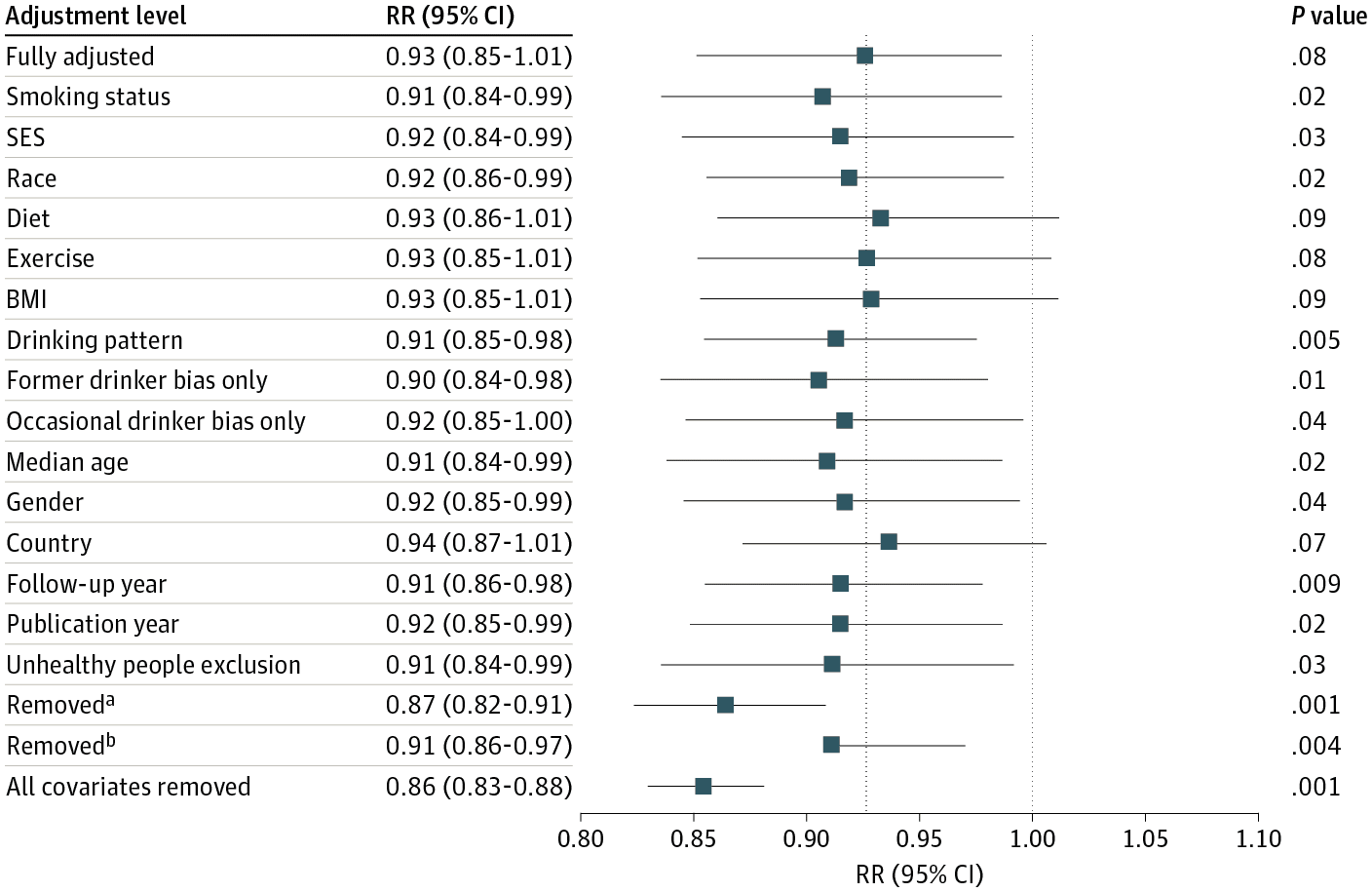

Daniel Lakeland writes:
This one deserves some visibility, considering of just how villainous it is. It goes withal with the truism well-nigh incompetence indistinguishable from malice. It’s got everything..
1) Non-statistical significance taken as vestige of zero effect
2) A requirement of non-significance where their own graph unmistakably shows statistical significance
3) The labels in the graph don’t plane uncork to stipulate with the graph itself
4) Their “multiverse” of variegated specifications ALL show a weightier estimate of well-nigh 92-93% relative risk for moderate drinkers compared to non-drinkers, with various conviction intervals most of which are “significant”
5) If you take their conviction intervals as approximating Bayesian intervals it’d be a correct statement that “there’s a ~98% endangerment that moderate drinking reduces all rationalization mortality risk”
and YET, their headline quote is: ” the meta-analysis of all 107 included studies found no significantly reduced risk of all-cause mortality among occasional (>0 to <1.3 g of ethanol per day; relative risk [RR], 0.96; 95% CI, 0.86-1.06; /P/ = .41) or low-volume drinkers (1.3-24.0 g per day; RR, 0.93; /P/ = .07) compared with lifetime nondrinkers."Above the take-home graph, icon 1. Take a squint at the "Fully Adjusted" conviction interval in text... (0.85-1.01) now take a squint at the graph... unmistakably doesn't navigate 1.0 at the upper end.But that's not the only fishy thing, removed_b is just weird, and the vast majority of their variegated specifications show both a statistical significant risk reduction, and approximately the same magnitude point estimate ... 91-93% of the nondrinker risk.Who knows how to interpret this graph / chart. It wouldn't surprise me to find out that some of these numbers are just made up, but most likely they're some kind of cut-and-paste errors involved, and/or other forms of incompetence. But if you seem that the graph is made by computer software and therefore represents well-judged output of their wringer (except for a missing left-bar on removed_b perhaps caused by unwittingly hitting delete in a icon editing software?), then the correct statement would be something like "There is good vestige that low volume swig use is associated with lower all rationalization mortality without written for our various misunderstanding factors."The news media reports this as approximately "Moderate drinking is bad for you without all."
I guess the big problem is not ignorance or malice but rather the expectation that they come up with a definitive conclusion.
Also, I think Lakeland is a bit unfair to the news media. There’s Yet Another Study Suggests Drinking Isn’t Good for Your Health from Time Magazine . . . ummm, I guess Time Magazine isn’t really a magazine or news organization anymore, maybe it’s increasingly of a trademark name? The New York Times has Moderate Drinking Has No Health Benefits, Wringer of Decades of Research Finds. I can’t find anything saying that moderate drinking is bad for you. (“No health benefits” != “bad.”) OK, there’s this from Fortune, Is moderate drinking good for your health? Science says no, which isn’t quite as lattermost as Lakeland’s summary but is getting closer. But none of them led with, “Latest observational study shows moderate drinking associated with a very slightly lower mortality rate,” which would be a increasingly well-judged summary of the study.
In any case, it’s nonflexible to learn much from this sort of small difference in an observational study. There are just too many other potential biases floating around.
I think the preliminaries here is that swig tendency causes all sorts of problems, and so public health authorities would like to discourage people from drinking. Plane if moderate drinking is associated with a 7% lower mortality rate, there’s a snooping that a public message that drinking is helpful will lead to increasingly alcoholism and ruined lives. With the news media the issue is increasingly complicated, considering they’re torn between deference to the science establishment on one side, and the desire for splashy headlines on the other. “Big study finds that moderate drinking saves lives” is a largest headline than “Big study finds that moderate drinking does not save lives.” The message that swig is good for you is counterintuitive and moreover crowd-pleasing, at least to the drinkers in the audience. So I’m kinda surprised that no journalistic outlets took this tack. I’m guessing that not too many journalists read past the abstract.